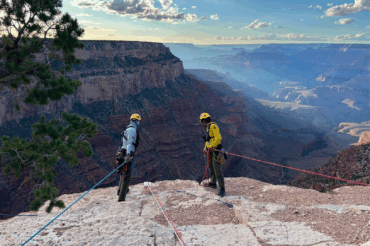This article was originally published on High Country News.
For the last several decades, efforts to transfer the oversight of federal land to states has arisen only in isolated legislative initiatives that eventually died out. But in a mad rush since 2012, 10 of the 11 Western states have commissioned or considered studies to look into hypothetical federal-to-state transfers. Just this spring, a dozen such initiatives have seen western legislatures; three have passed. And on Thursday, one failed in Colorado.

These efforts and studies refuse to go away, despite the unlikelihood of their ever going anywhere. They arose concurrently with a larger movement to actually enact those land transfers. The latter movement began when a number of Utah legislators, dissatisfied with the federal government’s management of lands, passed Republican Rep. Ken Ivory’s 2012 Transfer of Public Lands Act, demanding that the federal government hand over more than 20 million acres to the state. Ten other states have considered similar legislation since then. The argument for transfer is legally dubious, but western politicians have commissioned studies to ask if transfers are logistically feasible, and whether they could benefit their states’ economies.
The effects of a transfer would be different in every state—and each state that’s studied the idea has done so in a slightly different way. Utah commissioned university economists to look at potential economic outcomes of a transfer; Wyoming tasked local politicians to gather testimony on what effects a transfer would have. The studies use a diverse set of approaches—but critics of the movement maintain that misguided conservative politics power them all.
Some legislators are trying to distance themselves from the larger movement, at least on the surface, to prove that the studies they’re commissioning will be neutral. Rep. Kerry White, R-Montana, introduced House Bill 496, which called for $35,000 to study transfer feasibility. After the bill was tabled in March, the original transfer language was replaced with a call for a general analysis of federal management of Montana lands. In a hearing earlier this month, disagreement erupted over the purpose of the bill—whether it was meant to solicit neutral research, or simply to push forward the land transfer agenda.
In Utah, University of Utah economist Jan Stambro does not consider the bill that commissioned her study, An Analysis of a Transfer of Federal Lands to the State of Utah, merely a political push for land transfers. “The study was commissioned just to give answers,” she says. The bill called on neutral economists to conduct the study thoroughly, and the conclusions Stambro and her colleagues arrived atappear to be neutral, too. “Forecasting the full economic effects…is simply not possible,” the study conjectured, but it may be feasible, under certain circumstances, for Utah to profit from managing its federal lands. The study concluded that in some scenarios, in which Utah increases oil and gas development and negotiates high royalties, the state could likely cover management costs—if oil and gas prices remain high.
Here’s a rundown of the Western federal land transfer study bills and initiatives that have been proposed, passed or tabled since 2012.

Arizona: HB 2658, sponsored by Republican Rep. Brenda Barton, passed in March. It creates a committee of legislators to study impacts of a land transfer through consultations with experts and surveys of county commissioners. The cost of the study process is unspecified.
Colorado: HB 232, sponsored by Republican Rep. Randy Baumgardner, failed this week. It would have created a task force of Colorado county commissioners to study the transfer.
Idaho: Republican Rep. Lawerence Denney commissioned a legislative task force in 2013 to undertake a $20,000 feasibility study and a $61,000 legal study. The former investigated whether the state could generate enough income off the lands to manage them; the latter investigated the legal case for the transfer. The committee concluded that economically, the transfer might be feasible, though the legal case would be tricky. A minority of the task force dissented, arguing that a transfer would not be economically feasible based on the gathered evidence, and that it would be unconstitutional. This year, a resolution to continue the task force and charge it with looking further into how to take title of public lands, was tabled.
Montana: In 2013, the legislature commissioned an interim study on land management problems, one of which was dissatisfaction with the federal government, to be done by a council of legislators. The council’s report recommends better collaboration with local agencies and managers. This year, Rep. White’s bill, which asks for $35,000 to form a task force to focus a study on federal management problems, has passed the House and awaits the Senate vote.
Nevada: A $66,241 feasibility study taken on by county commissioners in 2013 found that a transfer could be very profitable for the state—in some scenarios, earning the state more than $200 million annually. However, an investigative report by Nevada television news station 8 News Now found their study to be politically biased.
New Mexico: This year, three study initiatives were killed in the legislature.
Oregon: Republican Rep. Wilson’s HB 3240 is on the table this year. The bill asks for the creation of a task force of legislators to gather testimonial research on the feasibility of a transfer. Its cost is unspecified.
Utah: In 2012, Utah passed Ivory’s study bill attached to the Transfer of Public Lands Act. It commissioned the nearly-800-page, $550,000 study by economist Stambro and her colleagues. Last year, Utah legislators established the Commission for Stewardship of Public Lands and funded it with $2 million to build a legal case and public relations campaign for a transfer.
Washington: Two transfer bills were killed this spring.
Wyoming: An $18,000 task force of legislators formed in 2013 gathered testimonial evidence on two occasions before recommending the state move forward with a transfer. The task force did not offer a formal report to support their conclusion. In March, Senate File 56 passed, which will give the Office of State Lands $100,000 to identify which federal lands could be transferred.
Kindra McQuillan is an editorial intern at High Country News.






